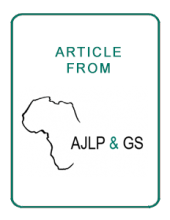Land Library
Welcome to the Land Portal Library. Explore our vast collection of open-access resources (over 74,000) including reports, journal articles, research papers, peer-reviewed publications, legal documents, videos and much more.
/ library resources
Showing items 82 through 90 of 135.FONCIER EN MAURITANIE : SITUATION, DÉFIS ET QUÊTE D’ADAPTATION(Article scientifique)Par Dr Ousmane WAGUE, coordinateur du master « Migrations, gouvernance foncière et territoriale »Université de Nouakchott Al Asria SommaireLE FONCIER EN MAURITANIE 
The residential property market in Zambia is characterised by lack of readily available property market data resulting in market values that do not reflect all market information.
The purpose of this paper is to examine the existing real property valuation practice in case of expropriation in Ethiopia and to propose potential bases and approaches compatible to the Ethiopian real property system based on desk review research in which existing literature are the main source.
In Nigeria, the spatial requirements of cadastral map for the purposes of land registration are based on 2D planimetric boundary coordinates without consideration for the elevation component of geometric space.
Situé en plein cœur de la forêt équatoriale dans le bassin du Congo, la région du Sud-ouest est sans doute l’une des plus riches du Cameroun. Elle comporte une biodiversité des plus diversifiées avec une importance significative des espèces endogènes ainsi que des espèces commerciales.
The aim of this paper is to highlight the determinants of women land access in Cameron and appreciate its effects on wellbeing trough income and consumption.
Since the commencement of land registration in Nigeria, less than 3% of land, mainly in urban areas had been registered. This is partly due to the prevalent sporadic method. Sporadic procedure of obtaining title is associated with many problems which include time and cost.
Climate change issues are contemporary global phenomena which affect the largest part of the world in different ways. This paper explores how local communities living in sensitive ecological areas, particularly in river valleys, respond to and adapt to climate change.
Les agrumes représentent la première culture irriguée dans la plaine de Trifa (Berkane, Maroc) avec une superficie en extension continue. Ceci accentue les pressions sur les ressources en eau déjà limitées dans la région.

